Teaching Your Puppy Not to Nip
Anyone who’s ever been nipped by a playful puppy can tell you how sharp those little pointy teeth can be. As if the pain of a puppy bite weren’t bad enough, one of the problems with puppies who nip is that they often grow up into big dogs that bite. That’s why it’s so important to teach your dog not to nip from a very young age.
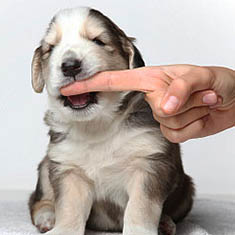
Why do puppies nip?
Remember that there’s a big difference between gnawing and nipping. Gnawing occurs primarily because your puppy is teething. The pressure of something rubbing against the dog’s gums helps the new teeth work their way through. Gnawing can help ease the pain associated with teething and shouldn’t be discouraged.
Nipping, on the other hand, occurs when a puppy gets overly excited while playing and bites the person on the other end of the toy. Sometimes playing with a toy isn’t even a factor. Puppies have been known to just gallop across a room and bite someone because it looks like fun.
Will puppies stop nipping on their own?
Some puppies eventually grow out of the nipping stage, but biting dogs are too serious a problem to leave this to chance. You need to be proactive to assure you don’t end up with a dog who will be a danger to your family and neighbors.
So, how do I stop my puppy’s nipping?
It will take patience and consistency on your part to convince your dog that nipping isn’t as much fun as he or she thinks it is. The basic idea is that you want your puppy to develop what is known as a “soft” mouth. What that means is that it’s okay for the puppy to take things in their mouths – after all, it’s what dogs do – but, he or she needs to learn not to use the teeth.
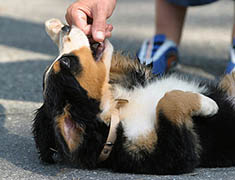
There are several methods you can use, so if one doesn’t work after a few weeks, try another until you find out what works well for your little crocodile-mouthed puppy.
If you’ve ever watched puppies play together, they will often bite each other as they wrestle, until the point when one puppy yelps in pain. If you can replicate this cycle, your puppy will soon learn that his or her biting hurts! If your puppy nips at you, immediately withdraw your hand and say “Oww” very loudly and in a high-pitched voice.
Refusing to play with the puppy for a short time, a sort of puppy time-out, will help the dog learn you are serious. They want nothing more than to please you and to play with you, so they will try to get you involved in the game again, but you must take a break for a few minutes before you start up again. Repeat this process every time the puppy puts his or her mouth on you.
While your puppy is in time-out, it is sufficient to just avoid engaging with him or her. There is no need to spank the dog, nor should you put the animal in his or her crate. You don’t want your puppy to associate the crate with punishment, as it should be a place of safety where the dog can go to get away from it all.
As part of your training and socialization process with the puppy, you should be teaching the “leave it” command. This is important for whatever your puppy decides to pick up, so you can use it when he or she picks up your hand or your toe, as well.
Check out our doggies den for more advice on socializing your dog.
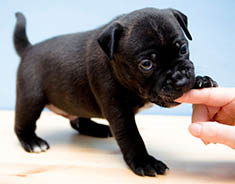
A second method is to substitute appropriate things to chew whenever your dog bites something inappropriate. If your dog bites at your hand, say “No” and hand him or her a chew toy. When the dog bites down on the toy, praise and reward the behavior. Whenever you catch your dog choosing an appropriate chew toy without your directing him or her to it, make sure you also praise and reward the animal.
Aversive training methods
Although most training should be positive, there are some aversive methods you can use if the puppy isn’t responding to your positive efforts.
One technique is to wear gloves that you have coated with something like bitter apple whenever you play with the puppy. Biting into the glove will produce a foul taste in the puppy’s mouth, and he or she will soon learn that biting is not a good thing.
You might also try keeping a spray bottle handy and spraying the dog’s face with a stream of water whenever nipping occurs. Alternatively, you can place several pennies in an aluminum can and shake the can whenever the puppy bites. Most dogs don’t like this noise and will usually stop whatever they are doing when they hear it.
Using one or more of these methods consistently should help you extinguish your puppy’s nipping behaviors, leaving you with a much safer adult dog in the end. For more information on this important topic, go to the Humane Society’s article on puppy nipping, or see what Drs. Daniel Estep and Suzanne Hetts of Animal Behavior Associates have to say about it.
Doggies Den: Latest Articles
 Homemade Thanksgiving Treats for Your Dog
Homemade Thanksgiving Treats for Your Dog
NUTRITION We all want to include our dogs in our holiday celebrations, but hopefully, you're aware that sharing table scraps with your dog isn't always the best idea.
 Keeping Your Dog Safe during the Summer Months
Keeping Your Dog Safe during the Summer Months
HEALTH Summer is coming on fast, so it’s time to plan how you will keep your dog safe and healthy through the lazy, carefree, warm days.
 Vaccination Time Again-Keeping Your Puppy Healthy
Vaccination Time Again-Keeping Your Puppy Healthy
DOG HEALTH So you have your new puppy picked out. There are quite a few shots, treatments and examinations that will keep the newest member of your family healthy.
 Canine Thanksgiving Feast
Canine Thanksgiving Feast
NUTRITION With the wide variety of food at Thanksgiving dinner, chances are you'll want to give your dog something special, too. If you're contemplating what to feed your dog for the holiday, here is a guide to a great Canine Thanksgiving Feast.
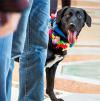 Dog Walking Tips Every Owner Should Know
Dog Walking Tips Every Owner Should Know
DOG FUN Walking your dog is not only crucial to keeping him healthy and happy, it strengthens the bond between your canine friend and his caregiver. There are a lot of obstacles out there. Don’t forget these simple tips to keep your walk fun and safe in the outside world.
 The Benefits of Physiotherapy for your Dog
The Benefits of Physiotherapy for your Dog
HEALTH The same techniques that physiotherapists use to treat a variety of injuries and conditions in humans have been adapted to suit animals with great success. Family pets, show dogs, and working dogs can all benefit greatly from physiotherapy. Dogs whose activities involve a lot of agility are especially susceptible to the types of problems that physiotherapy can address.
 The Decision- Adding a Dog to Your Family
The Decision- Adding a Dog to Your Family
FIRST TIME OWNERSBringing a dog into your family is a decision where many people don’t realize it’s magnitude until after they have the dog. There are a number of things that you need to research before you decide to purchase a dog, and it starts right in your own home.
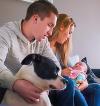 Bringing Your Dog Into Your New Baby's Life
Bringing Your Dog Into Your New Baby's Life
HEALTH Many believe that a dog and a new baby cannot happily coexist, so therefore the dog has to go. This is not necessarily the case.  A new baby does not mean you have to abandon your dog.

Doggies Den:
Most Popular Articles
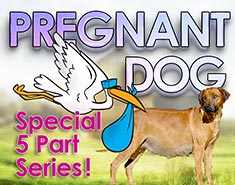
Dog Pregnancy Symptoms
HEALTHIf you suspect your dog might be pregnant, check out part one in this series on pregnant dogs, where we cover pregnant dog symptoms.
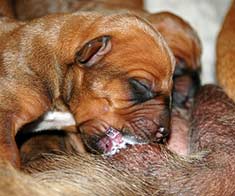
Dog Birth
HEALTHIn the third article of our dog pregnancy series, we look at the wonderful, but messy, process of bringing newborn puppies into the world.
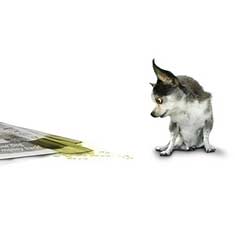
Indoor Dog Potties
DOG PRODUCTSIt's been a long day at work. You were so busy, you didn't even take time to eat a sandwich, let alone run home to let your dog out. You're on your way home, knowing the poor dog is crossing his or her legs by now, when your car breaks down, delaying you even further. Can't somebody make this easier?
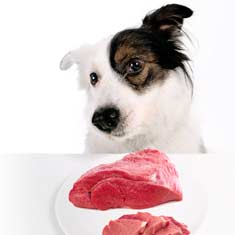
Your Dog’s Digestive System
PHYSIOLOGYEver wonder why your dog eats so fast? Or why he eats gross things? Or why he gets sick to his stomach? Or why his waste stinks so bad? Some of these things are normal, some are not.
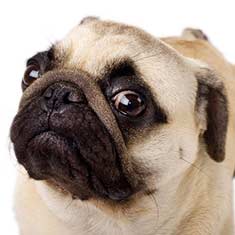
Canine Respiratory System
BREATHINGThe basic function of your dog's respiratory system is to bring oxygen in to and remove carbon dioxide from the body. Knowing the symptoms of respiratory diseases can help you help your stay healthy.
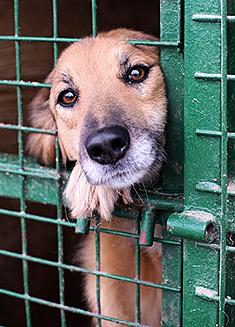
Shelter Dog Adoption Tips for Success
ADOPTION Are you intimidated by the prospect of "rescuing" a dog from a shelter? One reason that you may be wary of adopting a dog from a shelter is not knowing how to choose. Adopting a dog from a shelter can be a rewarding process, if you're prepared to do a reasonable amount of research.
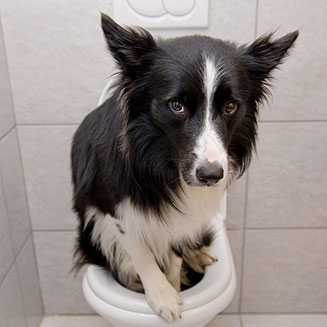
Canine Urinary Tract Infections
SYMPTOMS AND TREATMENTDoes your dog seem to be having trouble relieving his or her bladder? Learn how to recognize the signs of urinary tract infections and how to treat them before they spread.
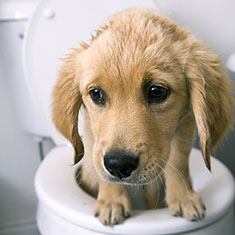
What to do for Dog Diarrhea
SYMPTOMS AND REMEDIESIf you have dogs in your house for any length of time, you have likely experienced at least one bout of dog diarrhea. Beyond the pain in the tuckus involved in cleaning up the mess, you should know what causes diarrhea, and when it's important to see the vet.
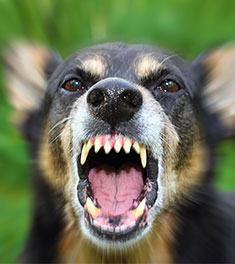
What to do for a Dog Bite
DOG BEHAVIOR Getting bitten by a dog can be scary, and you may be tempted to run around in circles for a while, trying to figure out what to do. Here's our guide to help you manage the situation.
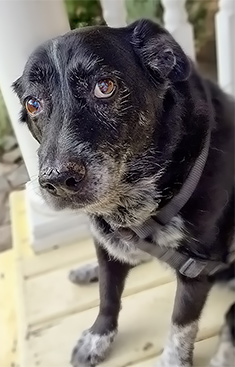
Top Ten Tips for Living with a Senior Dog
DOG HEALTH Bringing home a new puppy is so exciting, but it doesn’t take all that long for your exuberant puppy to grow into a senior dog who may have special needs. Here are the doggies.com top ten tips for taking care of your companion who has been with you through so much.
